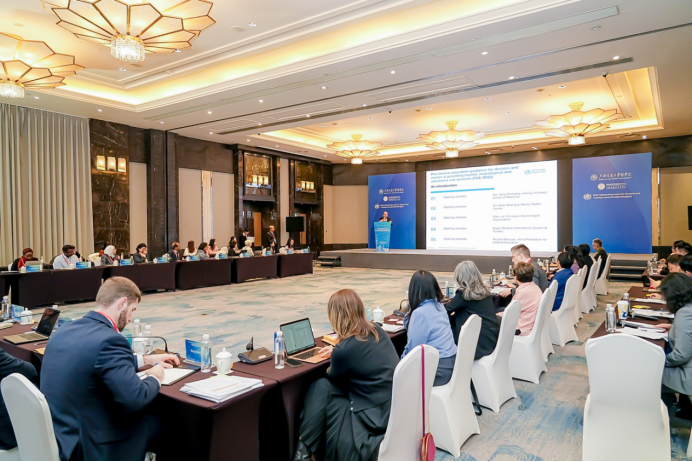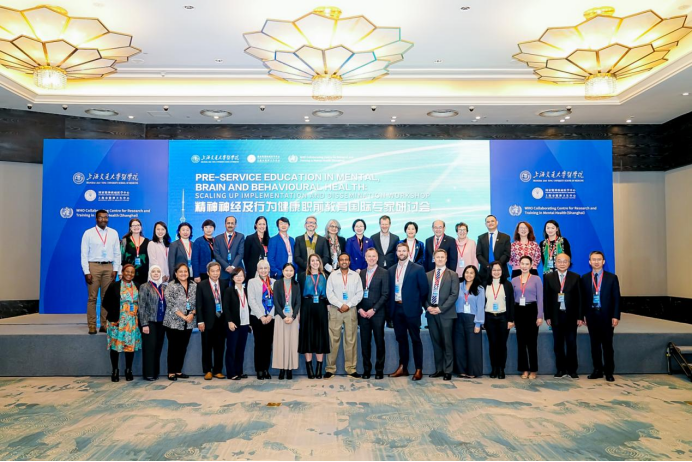On March 13, 2024, commissioned by the World Health Organization (WHO) and organized by Shanghai Mental Health Center, the “Pre-service education in mental, brain and behavioural health: Scaling up implementation and dissemination” was held in Shanghai. Eighteen experts fromseventeen countries participated in this grand meeting. Based on the pre-service education guidelines for doctors and nurses on mental, neurological andsubstance use in medical services (PSE-MNS), the conference brought together world’s leading experts to improve the dissemination and implementation of the guidelines, including identifying potential collaborators, sites for pilot implementation of the guidelines, and protocols for field testing.

The openingremarks of the workshop was hosted by Professor Xu Yifeng, Director of the WHO Collaborating Centre for Mental Health Research and Training at Shanghai Mental Health Center (Shanghai Mental Health Center affiliated to Shanghai Jiao Tong University School of Medicine). Professor Xu Yifeng extended a warm welcome to the participating experts. As he has pointed out, Shanghai Mental Health Center, as the Mental Health Center Affiliated to Shanghaiin Mental Healthand the National Center for Mental Disorders, is honored to cooperate with the WHO Department of Mental Health and Substance Use in hosting this workshop. The center sincerely hopes that this workshop will contribute to the advancement of mental health education, the promotion of international cooperation, and the breakthrough of the boundaries of medical knowledge.
At present, the imbalance between the supply and demand of mental health services in China is still a huge problem. Thissame situationexistsin other countriesas well, especially low - and middle-income countries. In most countries, there are too fewpsychiatristsandspecializedhealth professionals to fully meet health care needs. In addition, doctors and nurses in primary care and community settings are often the first resort for patients seeking mental, neurological and substance use medical services. In this context, inadequate capacity of primary care and community health providers can lead to poor access to care, unclear referral pathways, increased prevalence of mental illness and suicide, and poor adherence to treatment. Therefore, strengthening the capacity building of community health care services, expanding the accessibility of medical services, improving the level of medical service capacity, and fully empowering community medical workers are the fundamental goals for developing medical education in China in a bid to promote the construction of Healthy China.
“With the strong support of the Shanghai government, Shanghai Jiao Tong University School of Medicine, together with 13 affiliated hospitals, inaugurated the ‘Shanghai General Practice Education and Training Center’ at the beginning of this year to officially launch the professional ability training for general practitioners in 66 community health service centers among 16 districts of Shanghai.” Jiang Fan,Chair of the Deans Council of Shanghai Jiao Tong University School of Medicine, believes that as the only tertiary specialized hospital in Shanghai, the affiliated mental health center will play a leading role in the field of mental health. As theNationalCenter forMentalDisorders, it has also been one of the first professional academic support units to pioneer in innovative development to guide and support the whole training process. At the same time, the training on mental health will also become an important part of the training curriculum, which will be explored and implemented.
The guidelines for mental, neurological and behavioural health pre-service education for nursing and medical students, developed under the auspices of the WHO Department of Mental Health and Substance Use, provide an exemplary framework for high-quality mental health education for doctors and nurses in training. The guidelines developed by WHO standardize mental health pre-service education in three aspects: planning and preparation of education, identification of core competencies, and development of pre-service curriculum. Based on the best practices and research results of global mental health medical education, the guidelines provide a set of standardized education programs to help improve the quality and consistency of mental health pre-service education in different medical schools.
“Our center has been working with the WHO for nearly 40 years and is deeply involved in and supporting many global projects. We are honored to host this international workshop on mental, neurological and behavioral health pre-service education.” Zhao Min, president of Shanghai Mental Health Center (Mental Health Center affiliated to Shanghai Jiao Tong University School of Medicine), says that the workshop will focus on advancing mental health education, promoting cooperation and breaking the boundaries of medical education, and ultimately improving the overall service capacity of global mental health. The guidelines on mental, neurological and substance use pre-service education for nursing and medical students developed by the WHO provide a guarantee of high-quality mental health education for trained doctors and nurses. The guidelines will ensure a high quality level of pre-service education and further ensure their continued development of mental, neurological and substance use skills in both postgraduate andclinical settings.
Mark Humphrey Van Ommeren,Unit Head of the WHO Department of Mental Health and Substance Use; Espen Gade Rolland, President of the International Council of Nurses; Ricardo Leon-Borquez, President of World Federation of Medical Education; and Ali Shirazi, Chief of Child Health and Development Section ofUNICEF-China, thanked the Chinese experts for their commitment. They say that the guidelines can help different countries implement high-quality pre-service education based on their own situations, and further ensure the sustainable development of mental, neurological and substance use diagnosis and treatment capacity. This guideline will greatly help non-specialist doctors and nurses to provide high-quality medical services for mental, neurological and substance use disorders, solve the systemic bottleneck of referral to specialist doctors, and ultimately make it easier for patients to obtain medical opportunities and improve the level of mental health services.
Mental health is an important part of health. Mental health and mental health issues are major public health and social problems that are related to economic and social development and people’s health and happiness. People’s demand for mental health services calls for a more comprehensive structure of mental health education. The focus and goal of mental health pre-service education is to improve the understanding and ability of nursing and medical students to deal with mental health problems, cultivate their comprehensive quality and professional skills, strengthen the practicality of medical education, and provide necessary support and guarantee for their future medical work, especially general practice and community medical work. Under this circumstances, the guidelines for mental health pre-service education developed by the WHO solve the important puzzle in the training and construction of mental health ability in existing medical education, and it is very important for the development of mental health education in China.

During the two-day workshop, experts from all over the world provided the latest progress of WHO’s pre-service education programs, shared their high-level opinions on the PSE-MNS guidelines collected during the preparation of the workshop, and actively explore the main methods and needs for strengthening mental, neurological and behavioral health pre-service education for general practitioners and nurses worldwide.Theyput forward the route and plan for the implementation and dissemination of the guidelines, which will lay a solid foundation for improving the quality and coverage of mental, neurological and behavioral health services worldwide. The successful convening of the workshop will greatly enhance the attention and promotion of pre-service education in mental, neurological and behavioral health services in China and around the world, and make positive contributions to improving the service ability of medical staff in this field.

